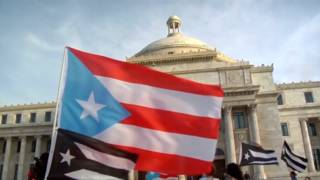
Lawmakers in the House of Representatives have introduced the Puerto Rico Status Act, which would allow residents of the longtime U.S. colony to begin the process of self-determination and decide on the island’s territorial status. The bill sets up three options for residents to choose from in a referendum — U.S. statehood, independence or sovereignty in free association with the United States — and commits Congress to abide by the results. We speak to San Juan’s former Mayor Carmen Yulín Cruz about the shortcomings of the bill, which she says lacks clarity on what each status would mean for Puerto Ricans. Among the concerns are whether Spanish would be taught as a primary language in government-funded public schools. Many do not understand “the rush to do it and, in doing so, not allowing the Puerto Rican people to have all the information to exercise their freedom to choose,” says Cruz.
This content originally appeared on Democracy Now! and was authored by Democracy Now!.